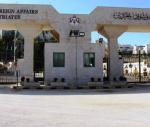You are here
The challenges of the avant-garde university
Jan 10,2018 - Last updated at Jan 10,2018
When much attention is given to higher education today, it is necessary to reconsider the role of the university in an ever changing and globalising world. For universities are seats of knowledge that cannot be separated from their regional and international societies. They are meant to put into practice what is learned in the classroom and inspire next generations into the transfer of knowledge to take higher education forward.The points that need to be addressed instantly are few, but crucial:
Where are we heading up? Towards teaching, research or community service institutions?
The cutting-edge dogma: from the sage on the stage to guide by the side!
Critical thinking as opposed to traditional methods of teaching.
Spin offs, professionalism and distinction.
Internationalisation of knowledge and global linkages.
From job seekers to job
creators.
Productive and economy based knowledge.
Common literature reflects the university's place as a dominant player in a global system increasingly driven by in-depth knowledge, information technology and research. For knowledge is reinstating other resources as the main driver of economic growth, and education has undoubtedly become the basis for individual success and social progress.
Recent studies have shown that universities contributed nearly £60 billion to the economy of the United Kingdom in 2007-08. And, of course, this impact is not just national but universal. UNESCO, on the other hand, reports a 57 per cent increase in the numbers of students studying outside their home countries in the past decade.
Singapore, for example, hosts nearly 90,000 international students. And China has led another radical model, perhaps the most remarkable in human history in and of itself. By the end of this decade, however, China is expected to be the world's largest producer of PhD holders. While India's human resource development minister has affirmed that his country needs nearly a thousand new higher education institutions by 2020 to meet the market demands!
In short, our academy needs to find answers for a whole set of intricate questions, such as the following: How can we create educated minds capable of novelty and originality, if they are unable to think critically and envisage a world different from their own? What does it really mean to be "educated"? What is the core role of academic institutions? Are our universities institutions of vocational, occupational and career training, whose sole purpose is mainly to train students for jobs and market needs? Alternatively, are they institutions whose role and purpose are knowledge-oriented and, therefore, nobler? Should not studentship be a central, predominant concern for universities?
Be the answers as they may, the academy is experiencing precipitous transformation across demanding magnitudes of purpose, meaning and objective. Smart, frontline technology, together with sociocultural change and the ever-increasing cost have left us with several perplexing challenges, a fact which forces many of us to be highly groundbreaking in an educational milieu that seems to be alert of change.
Marwan M. Obeidat is professor of American culture at the Hashemite University. He contributed this article to The Jordan Times.













